“The views expressed in this website are those of the author and are not those of any police service.”
Shit magnets and the Q-word
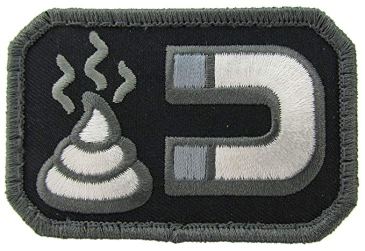
Are you a shit magnet? Warn your colleagues with a handy patch available from online retailers.
Just about every police officer I have ever worked with shares the same small superstition. During the shift, no one dares to say the word ‘quiet’. The sentence – “Wow, we’re having a really quiet shift” – or variations thereof, is strictly forbidden. If you do say the Q-word, and you then get called to anything more serious than a shoplifter, you are immediately given the blame. And you will be reminded of it throughout the rest of the shift plus named and shamed to anyone who asks how your shift is going.
It is acceptable to say it five minutes out from the end of your shift when the next crew is kitted up and ready to go. You can have a little fun and say it to them then. ‘Yeah, we had a really quiet shift. Hope yours is quiet too.” Then you give a little chuckle and make yourself scarce, because you just infected their shift with the Q-word.
It’s a silly little superstition and there’s actually next to no proof that it is real. More experienced coppers know that the real way to gauge how busy your shift will be is by whether or not you are partnered up with a ‘shit magnet’. A shit magnet is an officer who, through no apparent fault of their own, is always in the middle of the action when the big jobs go down. They will start their shift by warming up with an armed robbery before finishing big with a double murder.
People skulk around in the locker rooms before their shift saying things like – “Do I have to work with [insert officer name here]? S/he’s a real shit magnet, we’re going to get smashed.”
The shit magnet will almost always deny being a shit magnet, but anyone partnered up with them will recognise it and try to bribe the roster clerk so they never work with them again. The only officers keen to work with a shit magnet are generally those with a minimum of service and an overabundance of enthusiasm, who want to ‘experience’ everything the Job has to offer. Every station needs these officers.
I myself am pleased to be an anti-shit-magnet. Through good luck rather than good management, I have a special knack for avoiding the big jobs. The officers on the shift after mine are at risk of it all going pear-shaped, because shit happens daily, just not on my watch. I haven’t managed to identify what makes me teflon-coated but when I do, I shall bottle it and become rich. In the meantime, I’ll make the most of kicking back to watch the big jobs on the local news, rather than seeing them first-hand.
I’ll make the most of my quiet shifts… damn it… I said the Q-word… I only have myself to blame now…
‘A Time To Run’ update
My award winning novel ‘A Time To Run’ is now available online worldwide through Amazon, iBooks and other retailers. The second ‘Constable Sammi Willis’ novel – ‘The Twisted Knot’ will be online shortly. I’m excited to be able to offer these to an international audience after its success in Australia.
There’s not many serving police officers writing crime – I can offer an intimate insight into policing in Australia.
Buy it here or at your local online retailer.
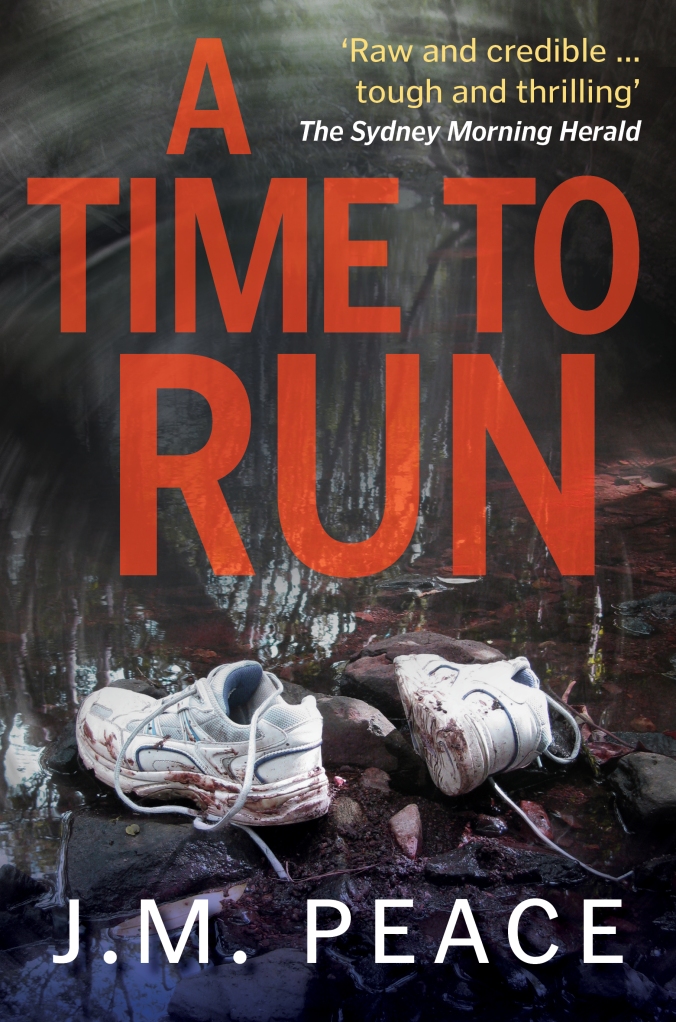
Guns and policing: an Australian perspective
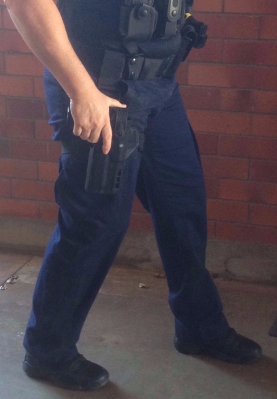
I’ve never had to draw my firearm in 20 years of service as a police officer.
I’ve been following the case of US police officer Mohamed Noor, who shot and killed Justine Damond after she approached his police car. The court proceedings received a bit of air-time in Australia due to Ms Damond being an Australian citizen. Also, the tragic facts of the case made for compelling subject matter.
As a police officer, I tried to put myself in Mr Noor’s position and think how I might have reacted. Night-time in a dark alleyway, a sudden noise, a figure at the side of the car.
Although I’ve been a police officer for twenty years, I’ve worked only in Australia, and there is no comparison. One crucial difference to policing in the two countries deeply impacts a situation like that – the prevalence of and attitude towards guns. That gun culture has a huge flow-on on effect to the way police approach their duties.
In twenty years, I have NEVER drawn my service weapon, except at training. I have only once been to a job where my partner has felt compelled to draw his weapon (I thought he over-reacted). From this, you can guess that I have never been confronted with a person armed with a weapon. I could count on one hand the number of times I have found a firearm at the scene after the offender is safely in cuffs.
I don’t know of any officer who wears a personal bullet proof vest. We have station-issue vests in different sizes which we put in the back of the police car. If we get sent to a job where there is a firearm involved, we stop before we get there and put the vest on. I can think of only three occasions I’ve worn it in earnest.
My experiences aren’t unusual. Guns on the street in Australia are unusual.
If I was confronted by a person in a dark alley, it wouldn’t occur to me that I might be ambushed. Sure, we’re taught that every situation is high risk or unknown risk. There is no such thing as low risk as you never know what is going to happen next. That said, I wouldn’t approach the job as if I may be randomly shot. A bang on the window would not have me reaching for my gun. That may be complacent and dangerous but, frankly, the odds are in my favour.
A Google search shows there were two police killed on duty in Australia in 2017. Of these, only one was shot. I had to go back to 2017 because there were zero shooting deaths of police in 2018 and 2019 to date. Nineteen police officers have been shot and killed in the line of duty in the USA so far this year (May 2019).
I can’t imagine what it would be like to have to assume everyone you deal with is armed. It would skew every decision you made every time you dealt with anyone.
I can’t imagine how much more difficult the challenging job of policing would be with the potential threat of firearms at every job.
I can’t put myself in Mr Noor’s shoes that night because I come from a completely different policing background.
I can’t imagine being a police officer in America. I can only hope Australia’s gun laws stay strict. I want to leave my gun in its holster for the next twenty years.
Buy ‘A Time to Run’ here.
Excerpt – ‘An Unwatched Minute’
There’s been strong interest in my new novel ‘An Unwatched Minute’, a police procedural about the fallout from a death in custody at a small police station. Here is a short excerpt to whet readers’ appetites.
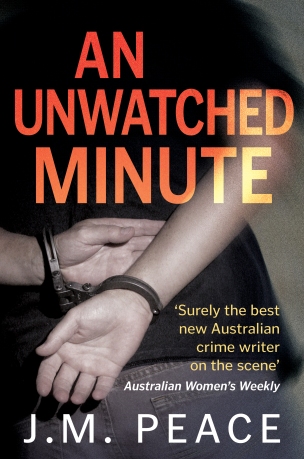
“A sharp metallic bang roused Karen Cornell from a deep dreamless sleep. Although her eyes snapped open, she held the rest of her body still, waiting for the next noise. A man’s voice. A single shout.
Simon didn’t stir. He had learnt to sleep through it all. She envied him.
She heard a familiar voice speaking quietly, but magnified by the peace of the night. She shut her eyes again. Everything was under control. Nothing for her to worry about.
This was the downside to living right next door to the police station.
As the officer in charge of the police station, her husband wasn’t obliged to live in the service residence right next door but it was free rent and the world’s shortest commute. And even though she wasn’t a police officer and whatever went on at the station was really none of her concern, she could not count the hours of lost sleep it had cost her. She was a light sleeper, a habit she had learnt when her kids were young, but which she didn’t seem to be able to unlearn now they were teenagers and could tend to their own needs at night.
Although her knee itched, Karen held still and pretended she was asleep. Hopefully in a minute or two, she would be again.
The next set of sounds she could easily recognise. It was the handle latch of the paddy wagon being lifted and the door being pushed open. God, she’d been living here too long to be able to identify that. Just one of the side-effects of being a copper’s wife. She wished they could move back to their own house in Brisbane. It was in a quiet street and they were in the catchment for a great school for the kids to finish their high schooling in. Simon kept saying they wouldn’t have to be patient too much longer, it was just a matter of time before he got his promotion back to Brisbane.
There was a dull thud outside and then another. A hissed whisper. Footsteps, two voices, then the sound of someone vomiting. Thank god they weren’t close enough to get the smell from that. She shifted, stretching her legs out and rolling onto her back keeping her eyes loosely shut.
It wasn’t until afterwards – when the yelling for help got her husband out of bed, and the ambulance had come and gone – that Karen realised she’d heard a man die.”
Available through Amazon worldwide. Australian readers can buy it here.
My new book – An Unwatched Minute
You haven’t heard much from me lately but that doesn’t mean I haven’t been working. Working x 2, in fact – after many years of working part-time as a police officer to be home with my kids, a change in my circumstances has seen me return to full-time shift work. I’m back on the road as a first-responder, bouncing from domestic violence incidents to traffic accidents to burglaries. So writing has been on the back burner. The publishing industry is a cut-throat one and after a couple of false starts, an attempted genre change and no success with traditional publishers, I’ve decided to self-publish a new book online through Amazon/Kindle.
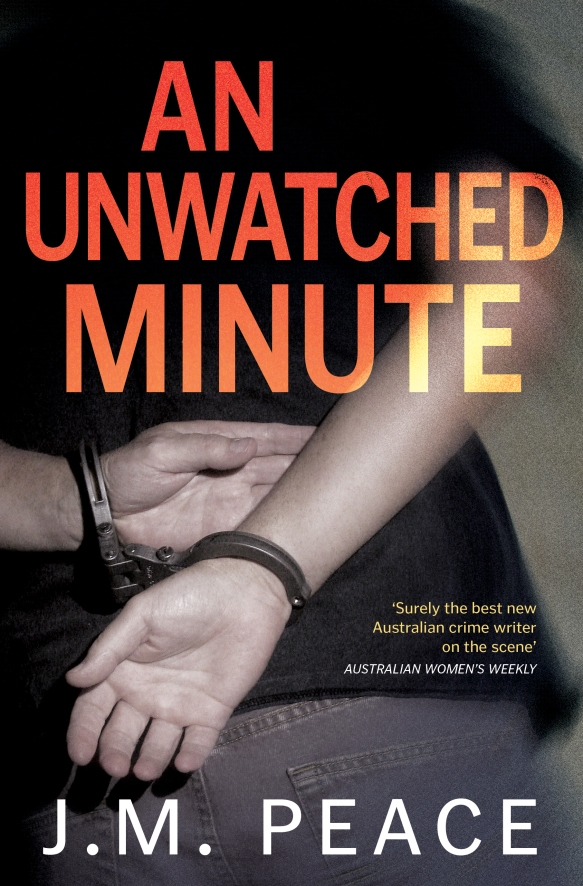
Available on Amazon
‘An Unwatched Minute’ showcases what I do best – it’s a police procedural. After twenty years as a police officer in Queensland, Australia, I can take readers behind the scenes of a police station and provide a unique insight into police culture. ‘An Unwatched Minute’ revolves around a death in custody and the ensuing police investigation which has far-reaching repercussions for the local police, as well as the family of the dead man.
You can buy ‘An Unwatched Minute’ through Amazon here.
On top of releasing this new story, I am also in a position where I can take charge of my previous stories. In the very near future, I will be releasing ‘A Time To Run’ and ‘The Twisted Knot’ for online audiences world wide. I personally prefer holding an actual book in my hands so I’m researching print-on-demand options as well. Good news for those people who have enquired about ‘A Time To Run’ which has been out of stock for a while now.
So stay tuned, there’s more to come…
The other side of the world
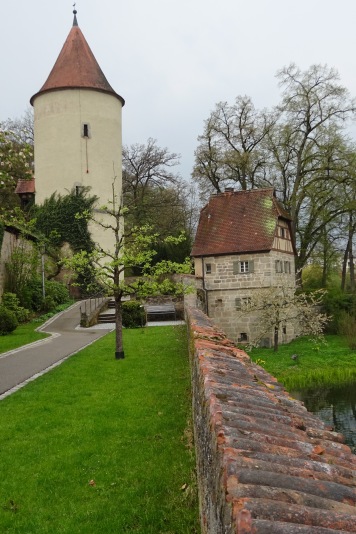 It was a typical winter’s day on the harbour at Bremen, Germany on the 27th of November, 1964. There was an icy cold wind that stung any exposed skin and gnawed right through to the bone.
It was a typical winter’s day on the harbour at Bremen, Germany on the 27th of November, 1964. There was an icy cold wind that stung any exposed skin and gnawed right through to the bone.
The ‘Flavia’ pulled out from the dock and struck a steady course towards the line of the horizon as if even the boat was keen to head to warmer climes.
Ilse Hopfengärtner stood on board the liner watching as her home country receded into the distance. She had chosen this when she had chosen her new husband, Heinz. He had arrived back in their small home town with stories of the warm wide welcoming land of Australia and his plans to return there to live. They had been married a matter of months later to secure a twin-berth on the ship, with Ilse’s parents having to give permission because she was not yet twenty-one years old. But the excitement of the adventure was tinged with trepidation as the only place where she knew the language, the culture, the lifestyle disappeared, slowly blending into the fuzzy line of the horizon. She was heading to the other side of the world.
Two years. She’d promised Heinz she’d stay for two years. He’d promised to bring her back if she really wanted to go home after that. It was four years later that they returned to Germany for a holiday and both knew by the end of it that ‘home’ was now on the either side of the world.
They lived in Melbourne, then moved to Queensland’s Sunshine Coast, back when there was only one set of traffic lights in Maroochydore. They raised two Australian children. It was really no surprise when their daughter, aged nearly twenty-one headed overseas for adventure. It was ostensibly to meet all of the German relatives and it was by plane rather than boat. But it still mirrored the journey Ilse and Heinz had taken nearly thirty years earlier.
Here’s where this becomes my story. I am the sometimes-wayward child, the Australian daughter of German migrants. I grew up knowing once my education was finished, I would head over to Germany to meet my family and see where my parents came from.
Both of my parents grew up in the town of Dinkelsbühl. It is one of those picture- perfect medieval towns, with a wall around it and crooked streets of cobblestones inside. My parents had told me stories about their childhood, about growing up in a small town, surrounded by family, where everyone knew who you belonged to. Before travelling to Germany, my idea of ‘family’ consisted of my parents and a brother. I had fifteen uncles and aunts and also fifteen cousins, most of whom I met for the first time. There was so much to catch up on, two family histories to absorb.
I then travelled further afield. I ended up using Germany as a base for international travels. Despite my mother’s fears that I would find love on the other side of the world as she had, I did return home after several years, once again making the Sunshine Coast home. I settled down and started a family of my own, a second generation of Australians.
Last week, I returned to Dinkelsbühl. It’s now been over fifty years since my grandmother hugged her youngest daughter, my mother, in the lounge room of the family home and begged her not to go to the wilds of Australia. My grandparents have long since passed away but my aunt and cousin still live at Wörnitzstraße 5, where my mum grew up. It has changed surprisingly little since last century. The house itself is hundreds of years old, the bricks themselves holding on to times past and keeping the memories in. Somehow it affects me. This history is my history, memories that aren’t mine seeping out through the floorboards and creeping into my bones.
In the twenty years since I was last in Germany, I’ve become an author. My first book has been published in German as ‘Die Hatz’ now and I went there to meet my publisher and publicise the book. My uncle took me to the bookshop in Dinkelsbühl where the proprietor has run the store for decades. Aged 83 now, he peered into my eyes and back through the years, to remember my parents when they were half my age. How strange then, to sign copies of my book for him, set in Australia and translated into German.
I have always been proudly Australian, quick to point out my foreign name did not mean I wasn’t born here. But my family history is part of me. I feel an intimate connection with this town on the other side of the world.
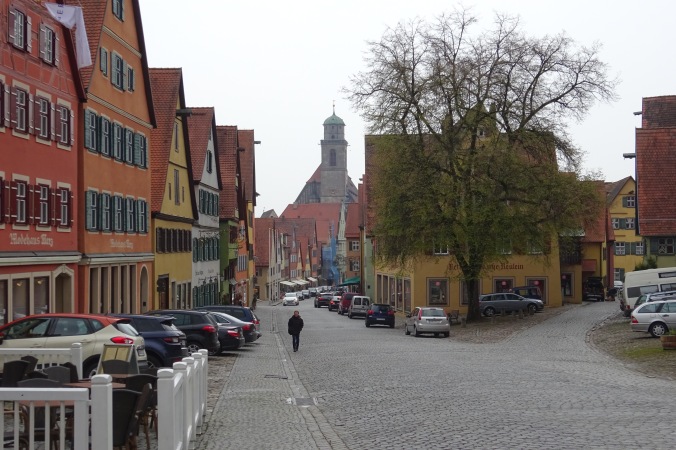
A foreign opportunity
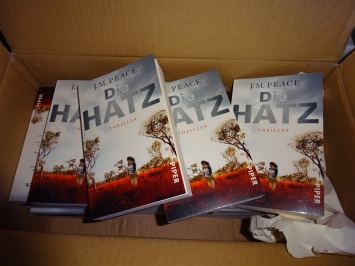
This box is waiting for me at my aunt’s house in Germany.
Exciting times. Today is my first international book release. ‘A Time To Run’ is released as ‘Die Hatz’ (The Hunt) in Germany through Piper Verlag. And it’s double the celebration. Not only is it my first foreign territory but both of my parents are German. They were nearly more excited than me when I told them the book would be published in their native language, and their brothers and sisters would be able to buy it at their local bookstores.
As I am bilingual, I decided to try to seize this opportunity and make the most of it. I have spent many hours writing content in German and trying to make some online contacts for publicity. And in about two weeks time, I am making a flying visit to Germany to meet my publisher and try to do a little publicity. I was extremely fortunate to secure a Regional Arts Development Fund grant through my local Sunshine Coast Council program, to assist with the costs. I’m also fortunate that my hubby is fully supportive of this plan and will take control of the work/kids/household juggle for a couple of weeks.
There was also a bit of a snowball effect. The book will be released in Spanish on May 17 through Ediciones B. When I told the editor at Ediciones B that I was coming to Germany, she invited me to come and visit her in Spain. So my German trip will include a side trip to Barcelona.
My head is spinning. My stomach is churning. I don’t want to stuff this up.
The thing is, writing is still a hobby for me. It must be. As a mid-list writer in Australia, it is impossible to pay the bills with proceeds from books. The population is too small. The competition for a reader’s dollar is too big. If you sell 5000 copies of your book in Australia, it is considered a bestseller. With a writer usually getting about 10% of the recommended retail price, you can quickly get an idea of what a writer’s finances look like. That’s why I’m still a police officer. The pay is much better, my family lives comfortably. But I dream of quitting, of being a writer and paying the bills as well.
Breaking into the foreign market can make a big difference for me. If the book sells well in Germany and Spain, the publishers will hopefully buy subsequent novels. Other European countries will be more likely to buy the books if they can see sales in neighbouring territories. There is a big potential here. Can I capitalise on this optimistic beginning? Will I crack book markets bigger than Australia? I’m about to find out. Wish me luck.

Damned Police
A man in a car does donuts in a crowded public space. The man then drives along a footpath brutally mowing people down and killing several pedestrians. The police are heavily criticised for not doing anything to stop him earlier.
A man in a car does donuts in a crowded public space. A police officer attempts to stop him by successfully shooting out the tyres of the moving car. The car however does not immediately stop – it veers out of control, onto a footpath and kills a pedestrian. Police are heavily criticised for shooting at the car in a public place because it doesn’t actually make a car stop completely.
A man in a car does donuts in a crowded public space. A police officer attempts to stop him by shooting out the tyres of the moving car. The police officer misses because this is an incredibly difficult thing to do. One of the stray bullets ricochets and hits a pedestrian, killing her. Police are heavily criticised for shooting in a public place.
A man in a car does donuts in a crowded public space. A police officer shoots the man at the wheel, killing him. Police are heavily criticised for over-reacting because his family says he was not a bad man, he was just going through a bad patch and didn’t deserve to die. People ask why the officer didn’t just incapacitate him by shooting him in the shoulder.
A man in a car does donuts in a crowded public space. A police officer attempts to tackle the driver through the open window. The police officer is thrown off balance, falls under the wheels of the car and is killed. The man then drives off, hitting several pedestrians. Although the officer himself is hailed as a hero, the police are heavily criticised for lack of training and that nothing further was done to try to stop the man.
Real life is not like a movie. Just because Bruce Willis could do it in ‘Die Hard’ doesn’t mean it can happen in the street. As a police officer, you are thrust into a situation and you have to think on your feet. You use your human skills and best judgement on what you know at that precise moment.
Maybe you know the person you are up against. Maybe you know he is violent and unpredictable, and has been threatening to kill. Or maybe you only know what you can see. An angry man in a car. But you do know that you will be held accountable for every decision you make.
As a police officer, you rely on your training. You have the voices of your superiors ringing in your ears to show restraint and caution. You also hear the voice of your own conscience. Is this justified? Can I live with the consequences of my actions, whatever I choose? Can I forsee all the possible consequences?
No one knows the ‘right’ answer at the time. The ‘right’ answer only appears afterwards with hindsight.
As a police officer, you are damned if you do and damned if you don’t.
J.M. Peace is a serving police officer and the author of ‘A Time To Run’ and ‘The Twisted Knot’.
Kids and social media
First published on Mamamia 31/1/2016
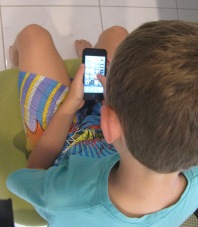 My son recently came home from school asking to have a look at Instagram. He told me one of his classmates had said he’d put my son’s photo up and he wanted to know if it was true. Neither of us have an account but it’s easy to create one and we quickly found the photo. It appeared innocuous. My son and two of his friends, smiling for the camera, taken after school.
My son recently came home from school asking to have a look at Instagram. He told me one of his classmates had said he’d put my son’s photo up and he wanted to know if it was true. Neither of us have an account but it’s easy to create one and we quickly found the photo. It appeared innocuous. My son and two of his friends, smiling for the camera, taken after school.
BUT – the account was set to ‘public’ meaning anyone can see the pictures. Over a thousand people were following the account. My son was wearing his school uniform. With the logo visible and readable. One of the other boys in the photo had no shirt on at all. I was alarmed. Because – and here’s the unfathomable part – my son is eight years old. The owner of the public Instagram account is seven.
I was flabbergasted. Outraged. Upset. But mostly baffled.
Surely this boy’s mother either did not realise her son’s account was public? Or she did not understand the inherent risks in letting a young boy have unregulated social media accounts? As a police officer, I have seen first-hand how gullibility and inexperience can lead much older and wiser people into the dark and twisty depths of the world-wide-web.
I spoke to some of my colleagues at the police station about it and we agreed this was a matter of education. I grabbed a brochure on cyber safety and approached the boy’s mother at the school gate that afternoon. The conversation I had with her left me more baffled than I began with.
Yes, of course she knew the boy’s account was public. She set it to private, but he changed it back to public. She said it as if that was the end of that. There’s nothing you can do about your seven year old’s social media settings? Really?
Yes, she knew he had over a thousand followers. They’re all just other kids of course, she told me. Are you kidding me? Are you naïve or optimistic?
Yes, he had his own phone, data and social media accounts but she regulated it all. The photo of my son and friends had been on the account for several weeks. So you think it’s okay to post photos of other people’s topless seven year olds to public accounts? How good is your regulation?
No, she didn’t need the brochure on cyber safety, she knew all about that. If you understood cyber safety, would we be having this conversation? Do you think I’m doing this for laughs?
I didn’t say all those things to her. It was all very polite, but I walked away from it shaking my head in bewilderment.
I told the school, but knew already there was little they could do. The photo was taken outside of school hours. The boy always kept his phone in his schoolbag until after school was finished.
The whole thing led to some interesting conversations in our household – conversations I didn’t think I’d need to have for years. My kids will only be allowed to have phones and (regulated) social media accounts once they are in high school. But I’ve found out the hard way that this does not mean they may not already be affected by the issues surrounding social media.
To make things crystal clear – paedophiles use these social media sites. We know this. Police find the images along with child pornography. They use places like Instagram to ‘collect’ photos, groom children, blackmail children or in the worst case scenario, track children. They sell or trade photos of children. They attempt to engage with children – it may start with complimentary comments on photos and lead to private messages and beyond. Occasionally, they may become obsessed with a child. Depending on what information they can glean from the account, they may have the child’s name, names of family members, the school they attend, the area they live in and sports teams they play on. They can hang out in a public place, watch for the child they already have pictures of and call out the child’s name to try to lure them. This is an extreme scenario that almost never happens. But the fact that it could happen, that all this information is accessible by creepy strangers should be enough to give a parent goosebumps. Especially when the child is too young to even understand there is something they need to protect themselves from.
Parents must educate themselves before allowing their children to have social media access. If they rely on what their child is telling them, or their own best guess, they are leaving their children exposed.
Fortunately, the same internet that can pose the dangers, can also offer valuable advice. The e-version of the cyber safety brochure I gave the other mother is available on the Queensland Police website at https://www.police.qld.gov.au/programs/cscp/personalSafety/children/childProtection/.
There is also loads of useful information at www.cybersmart.gov.au.
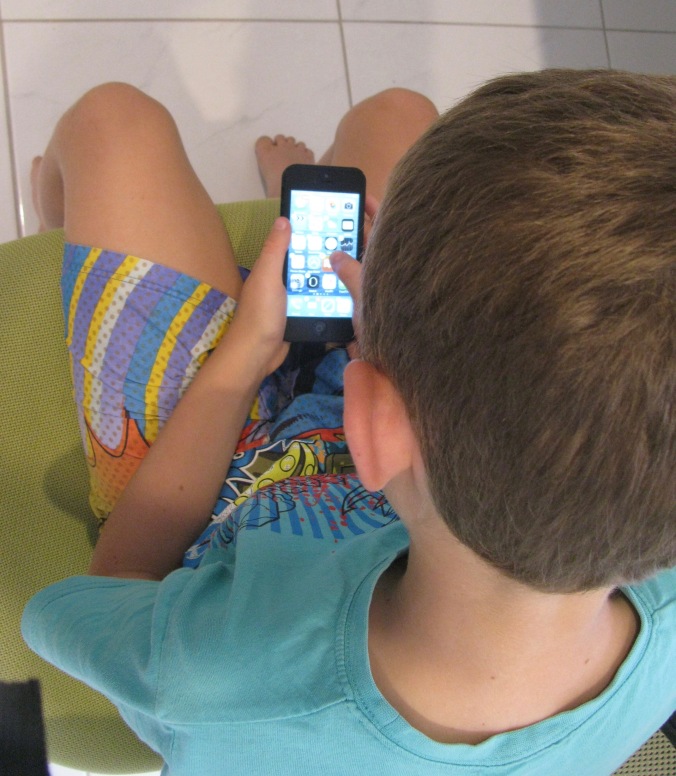 Educate yourself. Educate your children. Don’t pretend the predators aren’t lurking out there.
Educate yourself. Educate your children. Don’t pretend the predators aren’t lurking out there.
Teenagers, errors and the internet
 When I was in Year Ten in high school, we went on a school camp. It was a rustic bush-type camp. There was a single shower that everyone took turns to use. It wasn’t part of a bathroom, it was a single cubicle encased in fence palings with a bit of corrugated iron for a door. I think we had to boil water if we wanted to have a hot shower. My memory might be failing me a little – it was about 25 years ago.
When I was in Year Ten in high school, we went on a school camp. It was a rustic bush-type camp. There was a single shower that everyone took turns to use. It wasn’t part of a bathroom, it was a single cubicle encased in fence palings with a bit of corrugated iron for a door. I think we had to boil water if we wanted to have a hot shower. My memory might be failing me a little – it was about 25 years ago.
But I do clearly remember the boys started a competition of sorts. The idea was to burst through the cubicle door (which had no lock) and take a photo of fellow students showering. Male and female. There was a lot of bluster and bravado, and friends posted on guard outside the cubicle door. But one particular boy got several snaps of different classmates under the shower. He duly got the film roll developed at the local chemists (remember when we used to have to wait several days before we got our photos?) and for his trouble, he got several strips of blacked out negatives. Yes, whoever developed the photos decided they were inappropriate and simply didn’t print the photos and destroyed the negative. And that was the end of it.
In the news at the moment, we’ve heard about a simply vile website where teenage boys (and men too presumably), swap indecent photos of teenage schoolgirls, often posted with personal details such as their address and phone number. As the mother of both a girl and a boy, I find this horrifying from all angles.
But it did remind me of the Year Ten boys at camp in the 1980s. Curious and reckless teenagers engaging in voyeurism.
I’m still in touch with some of these boys. For the most part, they are husbands and fathers, and generally nice blokes. If I reminded them of what their fifteen-year-old selves got up too, they might laugh or maybe be a bit embarrassed. If they had successfully obtained prints of the photos, they may have been shared around amongst friends. In all honesty, if there were any nude photos of my male classmates, I probably would have had a look too. At some point, everyone would have had their fun and the photos would have disappeared into the bottom of someone’s locker and that would have been the end of it. The victims would have been angry and embarrassed, but it would have been a fleeting moment in the grand scheme of things.
Fast forward twenty-five years. Combine instant technology with the global reach of the internet and the power of anonymity, and the same scenario – teenagers behaving inappropriately – has turned into a hideous beast that has severely impacted many lives.
Teenagers, in general, will always engage in risky and ill-considered behaviour. I think it is part of the way their brains are wired – trial and error, along with the evolutionary need for independence. But their errors shouldn’t follow them for life.
There are girls testing their burgeoning sexuality. There are boys with fake internet accounts thinking they won’t be held accountable for their actions. And lives are being destroyed.
If a seventeen year old boy is tracked down as having posted a nude photo of a fifteen year old girl, he will be charged as an adult for child pornography offences. If they fall for the excitement, the competition and peer pressure of this type of website, they can end up on the sex offenders register.
If a sixteen year old girl sends a risqué selfie to a current boyfriend she has to understand – once an image is sent anywhere, to anyone, you have given it away. It is no longer yours. You have no more control over it. With the press of a key, it can start a frightening and endless journey around the world. You can never get it back. It can follow you into adulthood and impact on you long after you realise it was an impulsive error. Neither apologies or remorse will stop it.
The police should shut the website down. Sure. Agreed. But as the website is hosted in another country with different laws, it is not that easy. It’s not right, it’s not fair, but it’s reality.
The internet is part of life now. Teenage stupidity can now become a lifetime regret. I’m so glad there are no records of my early mistakes. I can only hope I know enough to steer my children through it when they reach this age of experimentation.